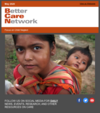This month's edition of the BCN newsletter focuses on child neglect and features a Special journal issue of Child Indicators Research, along with other publications addressing the topic in a variety of settings around the globe. Articles in the Special issue present international, interdisciplinary conceptualizations and analysis of the determinants, consequences, and measures of child neglect, the most common type of child maltreatment in many countries. Despite its lifelong negative consequences for children, families, and societies, child neglect still receives limited scientific and public attention.
Encompassing a range of situations in which the basic needs of children are not met, child neglect is characterized by the breakdown of the social organization around children and parents. Factors such as poverty, mental health issues, and family stress often compromise families’ ability to care for children, thus increasing the risk of neglect.
The severity of the immediate and long-term consequences of the COVID-19 crisis on families and on the systems of support available to them cannot therefore be ignored. Children with parents or primary caregivers who are ill or hospitalized may be left without appropriate care or supervision. Mobility restrictions and fear may disrupt customary care by the extended family or community members. Parents who are ‘essential’ workers and those who have no choice but to go out to work and cannot access day care for their children are left in impossible situations. Rising unemployment and poor working conditions (e.g., lack of paid sick leave) can interfere with the provision of adequate food, clothing, shelter, healthcare, education, and supervision.
Measures to prevent child neglect and to strengthen families and communities will have to be broader and probably deeper than ever before. They must put children at the centre, listen to families, and consider the wider socio-economic, cultural, and political conditions within which parents and other caregivers operate. States’ obligation to provide appropriate assistance to families so that they can fulfill their child-rearing responsibilities and strong multi-sectoral coordination will be key.
Child neglect will be a critical area of attention for practitioners, policymakers, and other actors in the care sector in light of the current COVID-19 pandemic and its longer-term impacts. And it will be crucial to center future efforts on research and documentation in this area to support evidence-based practice and responses. This newsletter issue aims to bring focus to the topic, highlighting recent studies and other resources that seek to understand child neglect and the interventions that address or prevent it from occurring. It also includes a section of tools, guidance, information, and other resources regarding children's care and protection during the COVID-19 pandemic.

